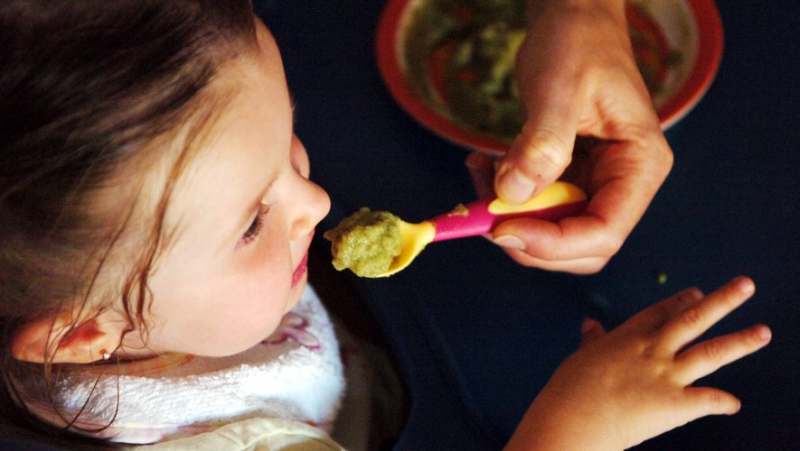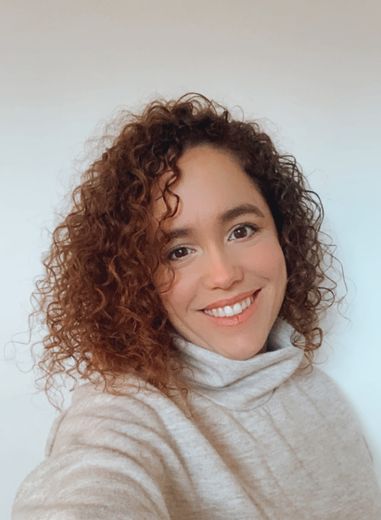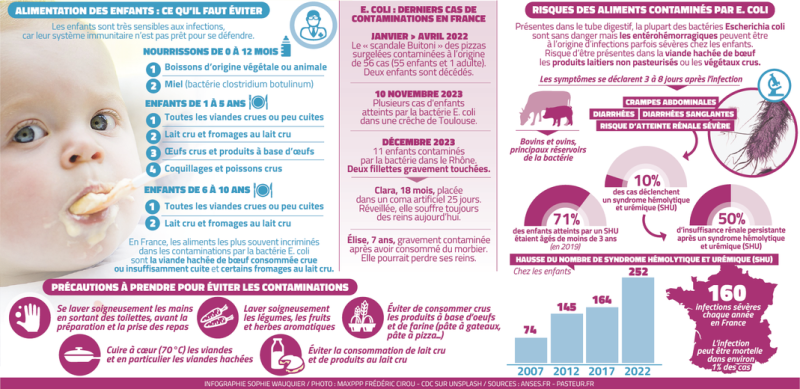“There are high-risk foods that should not be offered to little ones”: E.coli bacteria, allergies… the rules to follow

Des interdictions jusqu'à l'âge de 10 ans pour le lait cru et la viande mal cuite. Midi Libre – MICHAEL ESDOURRUBAILH
What mistakes should we not make in our children's diet ? Contaminated in December by the E.coli bacteria present in morbial, children are now suffering from hemolytic and uremic syndrome (HUS), dangerous for the kidneys, Public Health France indicated this week. Julie Carillon, doctor of nutrition, gives the keys.
Julie Carillon, doctor in nutrition, is the author of the book "108 questions and their answers, to know everything about the diet of your child from 0 to 2 years old" ; (ed. Hatier), and creator of Hamstouille, a digital parent advice platform created in 2020 in Hérault, with free access and paid subscription for personalized advice , via a team of fifteen people who work on nutrition from 0 to 6 years old.

Julie Carillon, author of the book "108 questions and their answers for your child's diet". DR
A problem of food poisoning with E.coli bacteria after children ate morbier is still in the news, recurring news since each year, Public Health France records at least a hundred reports of hemolytic and uremic syndromes, infections caused by e.coli. We must be vigilant about what we put on children's plates, we ignore the risks and consequences?
It’s a message that we try to convey daily. The recommendations of the national agency for health safety in food, environment and work (ANSES), the French association of ambulatory pediatrics (Afpa), are clear: up to five years, you have to be very careful, and today, even for raw milk and raw or uncooked meat, there are prohibitions up to at the age of ten.
Indeed, these are high-risk foods, and we should not offer them to very young children.
Anything that is raw milk, and cooked meals, or fast food products, burgers, pizza ?
There are no recommendations on prepared dishes, knowing that the more a dish is prepared under favorable hygienic conditions, the less risk there is for the patient. #39;child. There are fewer risks on what is frozen, and on what is prepared by large industry.
But sometimes bacteria gets into the manufacturing line. The risk of having this bacteria is the same for everyone, in children and in adults. But the problem is that the child has an immune system that is too fragile, and the infection, which the adult will also contract, can be serious for him, with after-effects. .
Which is the case of "Shun", hemolytic and uremic syndromes, which notably cause renal and neurological after-effects…
Yes, exactly.
"Honey should not be given to a child before the age of one year"
Until what age should you be very vigilant ?
It all depends on the food we are talking about. There are three age groups, with many prohibited before the age of five.
Honey should not be given to a child before the age of one year because there is a risk of botulism. For anything involving raw milk and raw or undercooked meat, it is believed that it should not be offered before the age of ten because there are really too many accidents. And for raw or undercooked eggs, raw or undercooked fish or seafood, not before the age of five.
Have the main stages of food diversification changed, in relation to these issues ?
Not in relation to these issues. But on the other hand, there was a lot of change in 2019-2020, we rather simplified diversification. Before 2019-2020, it was complex, and the advice differed from one place to another.
Public Health France homogenized all this and said, in summary, that we could give everything to children, except those foods with a high risk of toxic infection, without thinking too much about it. ;#39;order, and eating like the rest of the family, with as varied a diet as possible.
At what age can we start diversifying our diet ?
Between 4 and 6 months, when the baby is ready, it all depends on the child.
"Everything should be offered from the start, including foods with a high risk of allergy"
Without risk of allergy, another problem that worries parents ?
The more we delay the introduction of certain foods, and particularly those with a high risk of allergy, the greater the risk of developing an allergy. This is why they say that you have to offer everything from the start. At 4-6 months, we recommend peanuts, hazelnuts, cashews, eggs… all these foods known to be allergenic.
The sooner we offer them, the better, including for babies who have a mom or dad who has gone into anaphylactic shock with these foods. This subsequently reduces the risk. These foods must be offered early, and regularly, so that tolerance is maintained.
This would be preventive in terms of allergies ?
A priori yes. We have been working a lot in this direction since 2005-2006. This does not prevent the fact that there are more and more food allergies due to our lifestyle and our environment.
You always recommend organic ?
In absolute terms yes, but each family does what it wants according to its means and its values.

And about breastfeeding ?
The question has been settled for a long time, everyone agrees that breastfeeding is best for the baby, but we have a dairy lobby which is strong… breastfeeding has always been recommended, exclusively until 4 to 6 months, and up to two years by introducing diversification.
Of course, in today's society, breastfeeding and breastfeeding for a long time is not allowed for all mothers. Many find it difficult to get started because there is a lack of support, and even those who succeed encounter difficulties returning to work. We must not make mothers who do not breastfeed, who do not want to or can no longer, feel guilty. We also sometimes tell certain mothers to think again because they are exhausted trying to continue, and breastfeeding endangers their mental and physical health.
"If we want our diet to be healthy and varied in the long term, we have to lead by example"
What preconceived ideas do we have about children's nutrition that are nonsense ?
We see many families being very careful when diversifying their baby's diet, with organic, sugar-free, fresh produce, and when the baby is a year and a half and the baby is a year and a half old. #39;he starts to eat like the rest of the family, we switch to a diet that can be much less healthy. This is absurd!
Diet and future eating behavior are shaped during the first six years of life. Just because a child has been introduced to vegetables up to the age of one does not mean he or she will eat them later. , if we don't eat it.
IF we want our diet to be healthy and varied in the long term, we must already set an example and eat everything as a family. We also know that the first 1,000 days are important for the development of many things, including nutrition.
There is also the problem of obesity, which often begins in early childhood. Many parents are lost when it comes to basic balance ?
In the field, we do prevention with families because in today's generation of parents, many do not know how to construct menus and do not ;#39;have never learned how to eat to meet the needs of the body.
The biggest problem is sugar, we eat too much sugar, it is everywhere in industrial food, both in cakes and in industrial vegetables.
I subscribe to read more




